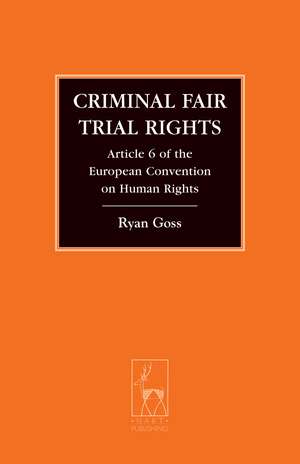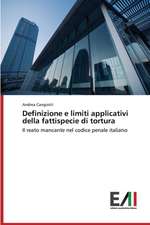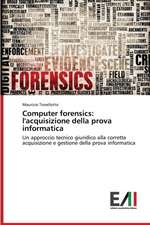Criminal Fair Trial Rights: Article 6 of the European Convention on Human Rights: Criminal Law Library
Autor Ryan Gossen Limba Engleză Paperback – 28 sep 2016
| Toate formatele și edițiile | Preț | Express |
|---|---|---|
| Paperback (1) | 257.50 lei 6-8 săpt. | |
| Bloomsbury Publishing – 28 sep 2016 | 257.50 lei 6-8 săpt. | |
| Hardback (1) | 569.53 lei 6-8 săpt. | |
| Bloomsbury Publishing – 10 sep 2014 | 569.53 lei 6-8 săpt. |
Preț: 257.50 lei
Preț vechi: 295.41 lei
-13% Nou
Puncte Express: 386
Preț estimativ în valută:
49.28€ • 53.20$ • 41.32£
49.28€ • 53.20$ • 41.32£
Carte tipărită la comandă
Livrare economică 19 aprilie-03 mai
Preluare comenzi: 021 569.72.76
Specificații
ISBN-13: 9781509909865
ISBN-10: 1509909869
Pagini: 254
Dimensiuni: 156 x 234 x 19 mm
Greutate: 0.36 kg
Ediția:NIPPOD
Editura: Bloomsbury Publishing
Colecția Hart Publishing
Seria Criminal Law Library
Locul publicării:London, United Kingdom
ISBN-10: 1509909869
Pagini: 254
Dimensiuni: 156 x 234 x 19 mm
Greutate: 0.36 kg
Ediția:NIPPOD
Editura: Bloomsbury Publishing
Colecția Hart Publishing
Seria Criminal Law Library
Locul publicării:London, United Kingdom
Caracteristici
The book takes a novel approach; instead of analysing the component rights one by one it takes a critical look at the case law through a number of 'cross-cutting' problems and themes common to all or many of the component rights.
Notă biografică
Ryan Goss is Lecturer in Law at the Australian National University, Canberra, and was formerly Junior Research Fellow in Law at Lincoln College, Oxford.
Cuprins
Introduction 1.1 Framing the scope of the argument 1.2 Framing the measuring stick against which the European Court's case law will be tested 1.3 Outlining the structure of the book and how the argument is developed Section IA Interpreting Article 6 A.1 The European Court sometimes seeks guidance from the Vienna Convention in interpreting Article 6 A.2 Object and purpose: the Court's attempts at teleological interpretation are marked by incoherence A.3 The European Court uses several techniques to overcome ordinary literal meanings A.4 The European Court inconsistently cites the need for 'practical and effective' interpretation A.5 The European Court's use of extrinsic materials is opaque A.6 Democracy and Article 6 A.7 Building the foundations for a new approach to interpreting Article 6 B The European Court's Role in Article 6 Cases B.1 The European Court adopts an ostensibly modest and deferential approach in Article 6 cases B.2 The European Court states that its role is not to enunciate general doctrines B.3 The European Court makes incoherent claims about avoiding abstract challenges B.4 The European Court describes its role as limited by the 'fourth instance' doctrine B.5 The Fourth instance doctrine is riddled with exceptions to the point of incoherence B.6 The European Court's approach to the law of evidence is marked by incoherence B.7 Building the foundations for a new approach to how the European Court describes its own role C Out of One, Many? The Internal Structure of Article 6 C.1 The European Court has adopted several approaches to the internal structure of Article 6 C.2 The European Commission's decision in Nielsen provided a reasonably clear approach C.3 The European Court sometimes describes the components of Article 6 as independent minimum requirements C.4 The European Court has used three approaches based on the 'specific aspects' maxim C.5 Building the foundations for a new approach to the internal structure of Article 6 D The Implied Rights D.1 What are the implied rights? D.2 The early implied rights jurisprudence was poorly explained D.3 At least eight justifications for implied rights can be identified in the European Court's case law D.4 The case law indicates uncertainty over the boundaries of the implied rights D.5 Building the foundations for a new approach to the implied rights Section IIE Assessing Infringements and Violations: the Puzzle of Article 6 E.1 Article 6 is different E.2 The 'proceedings as a whole' test is used inconsistently and incoherently E.3 Counterbalancing and defect-curing are attempts to provide a modest amount of structure to the European Court's balancing E.4 The European Court's 'never fair' case law is inconsistent with its other case law, and internally incoherent E.5 Assessing whether certain evidence was the 'sole or decisive' evidence against a defendant involves a particularly opaque form of semi-structured balancing E.6 The European Court is inconsistent in approaching the extent to which the public interest may justify a restriction on Article 6 E.7 Building the foundations for a new approach to assessing violations of Article 6 Conclusion
Recenzii
Criminal Fair Trial Rights by Ryan Goss represents an important and timely contribution to the literature on the most litigated provision of the European Convention of Human Rights...a refreshing issue-based approach.
In sum, this book offers innovative ideas, an original approach to the subject, a thorough analysis of the topics and extensive materials for academics and practitioners. The arguments put forward are clear, generally well-grounded and easily understood.
the book presents an exceptionally well-organised argument
In sum, this book offers innovative ideas, an original approach to the subject, a thorough analysis of the topics and extensive materials for academics and practitioners. The arguments put forward are clear, generally well-grounded and easily understood.
the book presents an exceptionally well-organised argument
Descriere
The Article 6 fair trial rights are the most heavily-litigated Convention rights before the Strasbourg Court, generating a large and complex body of case law. This book provides an innovative and critical analysis of Strasbourg's Article 6 case law.























